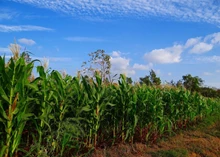
According to IFFCO CEO US Awasthi, the cooperative fertilizer major is likely to offer nano-DAP to farmers for Rs 600 per bottle (of 500 ml) beginning with the upcoming kharif season, as it expects government approval next month.
Farmers will save money on inputs because one bottle of nano-DAP is equivalent to one bag (of 50 kg) of conventional di-ammonium phosphate (DAP), which costs Rs 1,350, according to experts. Speaking at an agricultural conclave organized, Awasthi stated that over the next five years, the country's foreign exchange outgo on fertilizer subsidy will be zero because IFFCO's nano-urea does not require any subsidy, nor will its nano-DAP once it is available for sale.
He also stated that IFFCO is working on introducing nano-potash, nano-copper, and nano-zinc. Awasthi also stated that IFFCO has sold 4.85 crore of the 5 crore bottles produced.
"The government's subsidy on fertilizers will also be drastically reduced as the country moves toward self-sufficiency," he said. The government's fertilizer subsidy bill has risen to around 2.15 lakh crore from over 1.05 lakh crore (budget estimates) during the current fiscal year, after more than 1.09 lakh crore was requested as supplementary demands.
Earlier, NITI Aayog member Ramesh Chand stated that while crop MSPs can ensure stable prices for farmers, the best rates can only be obtained through fair market competition. In response to farmers' demand that MSP be made a legal right, he stated that farmers want the best price for their produce as well as protection from price fluctuations.
"In all cases, MSP is not the best price. It is unquestionably a stable price, but it is not the best price. The competition offers the best price. Farmers can get the best price if there is competition in the market," said Chand, who is also a member of the government-appointed MSP committee. Farmers should seize market opportunities rather than becoming overly reliant on MSP, he added.
The NITI Aayog member cited previous instances in some states where traders avoided the market when MSP was forced. If the fair market price is lower than the MSP, businessmen are likely to withdraw from the market, causing the government to face a fiscal problem.










